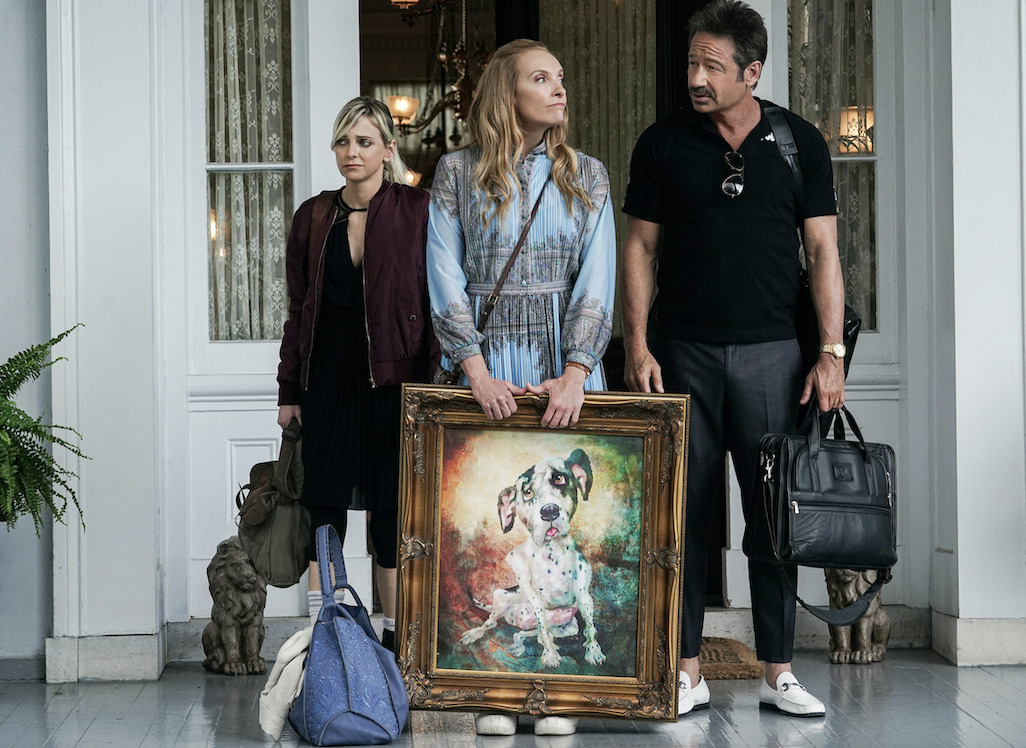Bringing their own unique personalities and sensibilities to difficult situations can infuse an all encompassing sense of comfort and ease into even the most diverse group of people. The seemingly diverse cousins of the new ensemble comedy, ‘The Estate,’ come to realize they’re all willing to sacrifice their senses of morality to try to garner financial security from an aunt they all despise.
‘The Estate’ was written and directed by comedy veteran Dean Craig (‘Love Wedding Repeat,’ ‘Death at a Funeral’). The film is now playing in theaters, courtesy of Signature Entertainment.
‘The Estate’ follows Macey and Savanna (Toni Collette and Anna Faris), two sisters who don’t have much in life, except the seemingly perfect plan to make quick, easy money. With their beloved, once thriving family café, Joe’s Triangle Café, on the brink of closing, due to failing to secure a bank loan, the duo conspire to reinstate their financial security by winning over their terminally ill Aunt Hilda (Kathleen Turner).
Macey and Savanna hope that if they take care of their aunt in her final days, they’ll become the beneficiaries of her vast estate. However, they end up facing several obstacles along the way that may thwart their plan, including the fact that she’s the family’s overbearing, irritable matriarch.
Macey and Savanna also discover their cousins – the dimwitted Richard (David Duchovny) and the seemingly perfect, put-together Beatrice (Rosemarie DeWitt) and her husband, James (Ron Livingston) – who they were close to when when they were kids but are now estranged from, have the exact same idea. As a result, the cousins are forced to pretend to love their aunt and fight for her affection, just to gain the upper hand in their clash over who deserves to inherit her fortune.
While the motivations behind Macey and Savanna’s decision to persuade their Aunt Hilda to name them as the sole heirs to her titular estate are simplistic, overall the two sisters are still presented as strong-willed female protagonists. In their portrayals, Collette and Faris infuse Macey and Savanna with unique, but equally relatable, personalities that showcase their need for the inheritance, in order to save their family’s business that they both so dearly cherish.
Collette give the standout performance in the film, as she emphasizes Macey’s caring, sensitive nature; she even initially ponders the morality of her sister’s suggestion that they try to secure their Aunt Hilda’s money for just themselves. While Macey expresses regret over manipulating her terminally ill aunt, Collette compassionately showcases how her character’s insecurities about the uncertainty of her finances lead her to overcome her ethical doubts in order to protect her future.
Macey and Savanna’s debate amongst themselves and with their cousins about why they should be left their aunt’s fortune is primarily played out in the captivating location of the latter’s mansion. The Estate was mainly shot in New Orleans’ historic Garden District, with the landmark Buckner Mansion, which has also notably been featured on American Horror Story: Coven, serving as Aunt Hilda’s imposing home.
‘The Estate’s production designer, Austin Gorg, effortlessly transformed each room throughout the Buckner Mansion to reflect Hilda’s distinct personality. Her unique sense of style is reflect in such elements as the bedroom that Macey and Savanna stay in while visiting their aunt, which features a unique animal theme, including on its mural tapestry.
The cousins’ own diverse sense of styles are also reflected through the clothing they wear, which were put together by costume designer, Dana Marie Embree. Every character is easily identifiable throughout the movie, as they dress from a different societal perspective.
Macey and Savanna dress in economical and comfortable clothing, which reflects the working class life they lead running Joe’s Triangle Café. Meanwhile, Richard, who goes by the nickname Dick, constantly dons lounge wear that emphasizes the party lifestyle he leads in Florida. Beatrice, who always wants to present the image that she leads a successful, metropolitan existence in New York City that’s superior to her cousins’ lives, dresses in impeccable business attire.
To continue the naturalistic visual look created by Gorg and Marie Embree, the comedy’s cinematographer, Darin L. Moran, also shot the feature in a way that grounded the actors’ comedic performances. While the cousins engage in extreme and absurd situations in an effort to sway Aunt Hilda’s decision about who to leave her estate to, Moran framed each performer in their own distinct way to highlight their actions and reactions.
Moran particularly showcased his talents through the way he filmed the cousins. From filming Duchovny in close-up shots while Dick stands closely near Macey and Aunt Hilday for his own benefit, to filming DeWitt in wide shots to emphasize Beatrice’s distant feelings towards her relatives, the movie’s cinematography is a perfect visual representation of how the family relates to each other.
While the idea of estranged family members only reuniting to argue about who should inherit money from a terminally ill relative isn’t groundbreaking in the world of film, the overall characters arcs in The Estate prove to be relatable and endearing. From the strong-willed female protagonists to Collette’s standout performance and the project’s naturalistic visual look, particularly its production design, costumes and cinematography, the movie is a much needed entry in the comedy genre.
Technical: B
Acting: A-
Story: B+
Overall: B+






